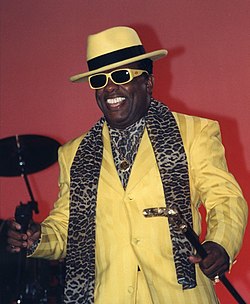
In 1990, Billboard magazine published a chart ranking the top-performing songs in the United States in the adult contemporary music (AC) market. The chart, which in 1990 was published under the title Hot Adult Contemporary, has undergone various name changes during its history but has been published as Adult Contemporary since 1996. [1] In 1990, 18 songs topped the chart based on playlists submitted by radio stations. [1]
Contents
In the issue of Billboard dated January 6, Michael Bolton was at number one with "How Am I Supposed to Live Without You", which retained the top spot from the final chart of 1989. [2] [a] Bolton's song held the top spot for one further week before being replaced by Rod Stewart's recording of the Tom Waits song "Downtown Train". [3] Stewart was one of five acts to achieve two number ones during the year, as he returned to the top of the chart in April with "This Old Heart of Mine". The song featured additional vocals by Ronald Isley, whose group the Isley Brothers had recorded the original version of the song in the mid-1960s. [4] Bolton, Mariah Carey, Gloria Estefan and Wilson Phillips also took two songs to number one during the year. Estefan and Stewart each spent a total of six weeks atop the chart, tying for the most weeks spent at number one during the year with Bette Midler, who spent six consecutive weeks in the top spot with "From a Distance", the year's longest unbroken run at number one.
In the second half of the year, Carey achieved the feat of taking her first two singles not only to the top of the Hot Adult Contemporary chart but also to number one on Billboard's pop singles listing, the Hot 100, [5] beginning a recording career that would ultimately make her one of the biggest-selling female performers of all time. [6] She would achieve six AC number ones in the first half of the 1990s, [7] before her music began to move in a more heavily R&B and hip hop-influenced direction. [6] In October, the Righteous Brothers reached number one with their 1965 recording of the song "Unchained Melody", which was re-released after it was prominently featured in the film Ghost . [8] Following the song's appearance on the film's soundtrack, the duo recorded a new version of the song, and both recordings entered the Hot 100, [8] but it was the original rendition that gained sufficient airplay on adult contemporary radio to enter and ultimately top the AC chart. [9] [10] The year's final number one was also taken from a film soundtrack; "You Gotta Love Someone" by Elton John, which spent the last three weeks of 1990 at number one, appeared in the film Days of Thunder . [11]


